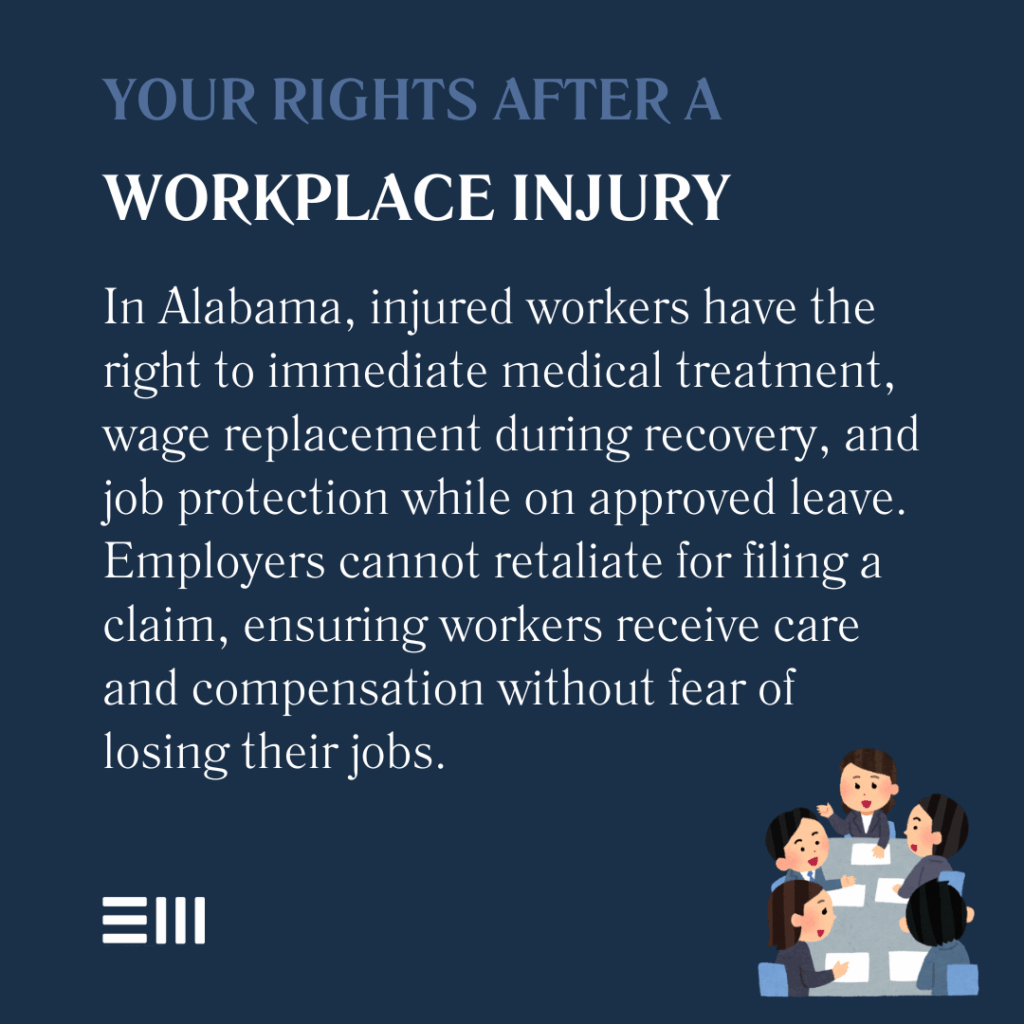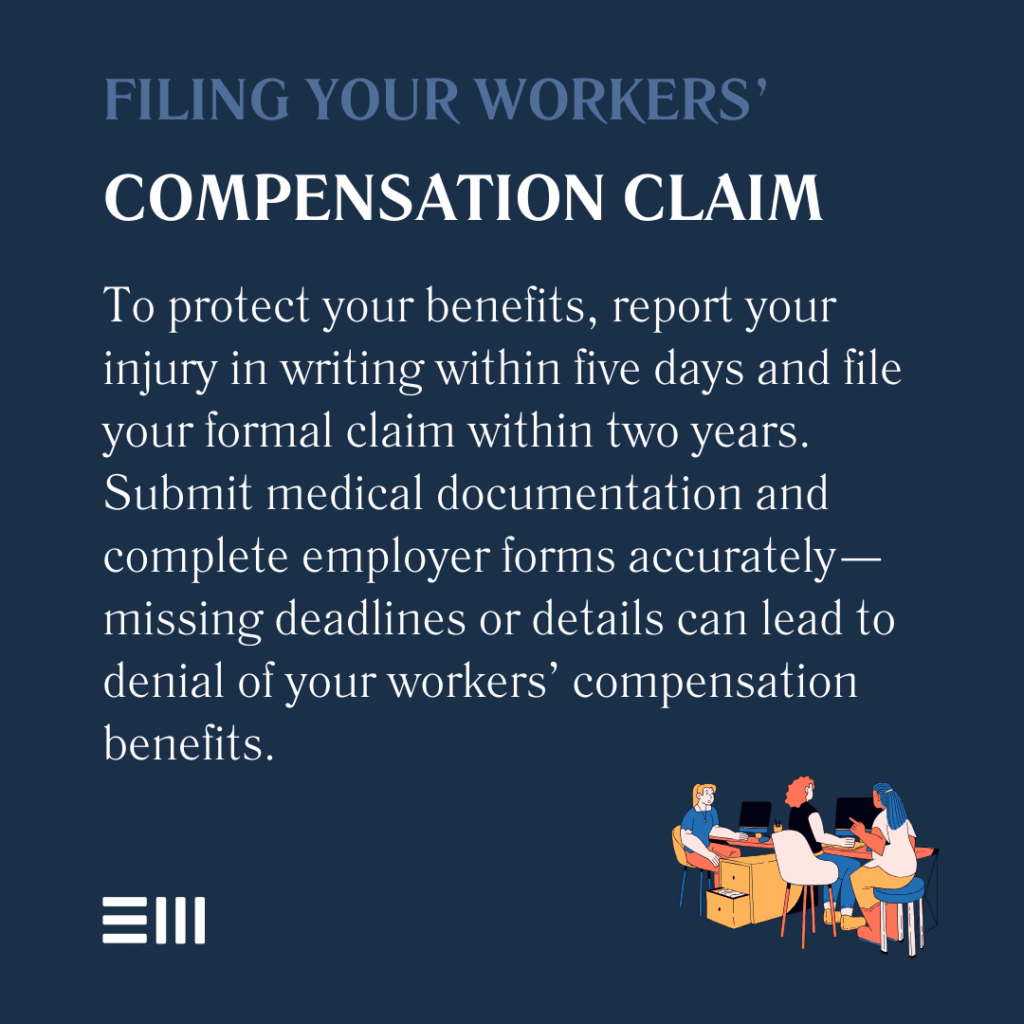
A forklift operator’s split-second decision to skip safety protocols leads to a crushed spine, transforming a routine warehouse shift into a life-altering medical emergency and legal battle.
Every seven seconds, a worker suffers an injury on the job in America, yet many Alabama employees remain unaware of their rights when workplace accidents strike.
Understanding injury at work claims in Alabama empowers injured workers to secure proper medical treatment, wage replacement, and compensation while navigating the complex intersection of workers’ compensation laws and employer responsibilities.
Understanding Your Rights After a Workplace Injury
Alabama law provides specific protections for employees injured during the course of their employment, regardless of fault.
Knowing these rights ensures you receive appropriate benefits and medical care following a workplace accident.
- Immediate medical treatment: Seek emergency care without prior authorization for serious injuries.
- Doctor selection: Choose from employer’s panel of four physicians for ongoing treatment.
- Wage replacement benefits: Receive two-thirds of average weekly wage during recovery.
- Job protection: Maintain employment status while on approved medical leave.
- Retaliation protection: File claims without fear of termination or demotion.
These fundamental rights form the foundation of injury at work claims in Alabama, protecting workers from financial devastation while recovering from occupational injuries.

Types of Compensable Workplace Injuries
Not all injuries qualify for workers’ compensation benefits under Alabama law. Understanding which injuries meet legal requirements helps determine your eligibility for filing a claim.
- Sudden traumatic injuries: Falls, equipment accidents, or vehicle collisions during work.
- Repetitive stress injuries: Carpal tunnel, tendonitis from repeated motions over time.
- Occupational diseases: Lung conditions, chemical exposure illnesses from workplace hazards.
- Aggravation of pre-existing conditions: Work activities worsening prior injuries or illnesses.
- Mental stress injuries: PTSD from workplace violence or traumatic incidents.
Each injury type requires specific documentation and medical evidence to establish the work-related connection necessary for successful claims.
Critical Steps After a Workplace Injury
Taking proper action immediately following a workplace injury protects your health and preserves your legal rights. Missing crucial deadlines or failing to follow procedures can jeopardize your entire claim.
#1: Immediate Actions
The first 24 hours after an injury often determine the success of injury at work claims in Alabama.
- Report to supervisor: Notify management immediately, even for minor injuries.
- Seek medical attention: Visit emergency room or authorized physician promptly.
- Document everything: Write detailed account of accident circumstances and witnesses.
- Photograph injuries: Take pictures of wounds, hazards, and accident scene.
- Preserve evidence: Keep torn clothing, broken equipment, or other physical proof.
These immediate steps create the evidentiary foundation supporting your workers’ compensation claim. For guidance on building a strong case, review our personal injury claim guide.
#2: Filing Your Claim
Alabama law establishes specific procedures and deadlines for initiating workers’ compensation claims.
- Written notice requirement: Provide written injury notice within 5 days.
- Statute of limitations: File formal claim within 2 years of injury.
- Medical documentation: Submit physician reports confirming work-related injury.
- Employer forms: Complete all required company accident reports.
- State filing: Submit claim to Alabama Department of Labor if disputed.
Strict adherence to filing requirements prevents claim denials based on technical deficiencies.

Benefits Available Through Workers’ Compensation
Alabama’s workers’ compensation system provides multiple benefit types designed to support injured workers during recovery.
Understanding available benefits helps ensure you receive full compensation.
- Medical benefits: All reasonable and necessary treatment related to work injury.
- Temporary total disability: Two-thirds of average weekly wage during recovery.
- Temporary partial disability: Wage supplement when working reduced capacity.
- Permanent partial disability: Compensation for permanent impairment ratings.
- Vocational rehabilitation: Job retraining for workers unable to return to previous employment.
- Death benefits: Support for dependents when workplace injuries prove fatal.
Each benefit category involves specific calculations and eligibility requirements requiring careful documentation and advocacy. Learn more about typical compensation amounts for various injury types.
Common Challenges in Workplace Injury Claims
Many injury at work claims in Alabama face obstacles that delay or reduce benefits. Recognizing potential challenges helps injured workers prepare effective responses.
- Employer claim denials: Disputes over injury occurrence or work-relatedness.
- Insurance company delays: Tactics to postpone benefit payments.
- Independent medical exams: Biased doctors minimizing injury severity.
- Surveillance investigations: Insurance companies monitoring daily activities.
- Light duty disputes: Disagreements over work capacity and restrictions.
- Settlement pressure: Premature offers before knowing full injury extent.
Professional legal representation often proves essential in overcoming these common obstacles to fair compensation.
Learn about how personal injury lawyers work on contingency to help injured workers.
Frequently Asked Questions About Injury at Work Claims in Alabama
Understanding injury at work claims in Alabama raises important questions about rights, procedures, and compensation options.
Can I Sue My Employer Outside of Workers’ Compensation?
Alabama workers’ compensation laws generally provide an exclusive remedy, preventing lawsuits against employers for workplace injuries. However, exceptions exist for intentional harm, third-party liability, or employers lacking required insurance coverage.
Product liability claims against equipment manufacturers or premises liability against property owners may provide additional compensation beyond workers’ compensation benefits. For detailed comparisons, see our guide on workers’ compensation vs. personal injury claims.
What If My Employer Doesn’t Have Workers’ Compensation Insurance?
Alabama requires most employers with five or more employees to carry workers’ compensation insurance. Uninsured employers face civil lawsuits for workplace injuries, losing immunity protections.
Injured workers can pursue direct legal action for full damages, including pain and suffering. The state’s Uninsured Employers Fund may provide limited benefits while pursuing employer assets.
How Long Can I Receive Workers’ Compensation Benefits?
Temporary total disability benefits continue until reaching maximum medical improvement or returning to work, with a 300-week maximum.
Permanent partial disability benefits vary based on impairment ratings and affected body parts. Medical benefits continue indefinitely for injury-related treatment. Vocational rehabilitation typically lasts up to 52 weeks. Understanding typical case timelines helps set realistic expectations.
Can I Choose My Own Doctor for Treatment?
Alabama employers control initial physician selection by providing a panel of four doctors. Injured workers must choose from this panel for authorized treatment.
After initial selection, changing doctors requires employer approval or showing inadequate treatment. Emergency care providers remain unrestricted for immediate injury treatment.
Let Justice Roll
Navigating injury at work claims in Alabama demands a thorough understanding of complex laws and aggressive advocacy against insurance companies.
Our experienced personal injury attorneys here at Baxley Maniscalco combine decades of workers’ compensation expertise with genuine compassion for injured workers.
We fight tirelessly to secure maximum benefits, ensuring you receive proper medical care and fair compensation while focusing on recovery. Don’t let insurance companies minimize your claim or pressure you into inadequate settlements.
Contact us today for a free consultation to discuss your workplace injury and discover how we protect Alabama workers’ rights every step of the way.
Can't find what you're looking for? Search our site below.










